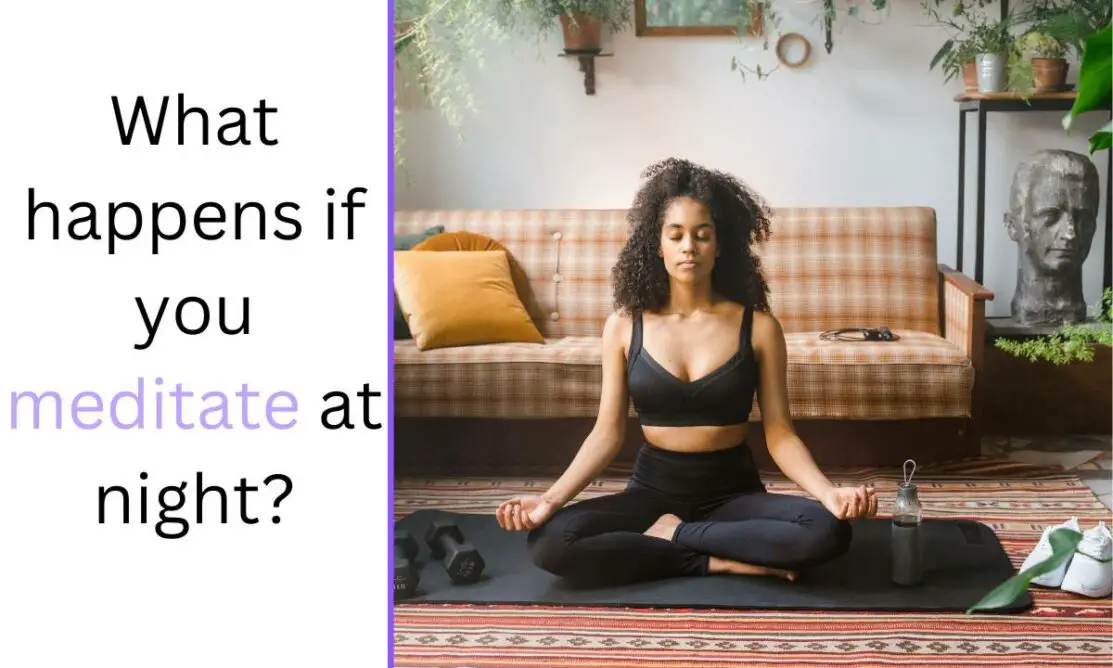Meditation is a powerful tool for calming the mind and body and can be beneficial for both physical and mental health.
But what happens if you meditate at night?
Does it have the same effects as meditating during the day?
In this article, we will explore the potential benefits and drawbacks of meditating at night, as well as some tips for getting the most out of your nighttime meditation practice.
We will also discuss how to create a nighttime meditation routine that works for you.
Can you meditate in bed at night?
Yes, you can meditate in bed at night.
It’s a great way to relax and wind down before going to sleep.
All you need to do is get comfortable in bed, close your eyes, and focus on your breath. You can also focus on a mantra or a calming image.
If your mind starts to wander, just bring your attention back to your breath.
You can also try guided meditations or listen to calming music.
Meditating in bed can help you relax and drift off to sleep.

The Benefits of Meditating Before Bedtime
Meditating before bedtime can be a great way to relax and get ready for a good night’s sleep.
Here are some of the benefits of meditating before bedtime:
1. Improved Sleep Quality: Meditating before bedtime can help you relax and clear your mind, allowing you to drift off to sleep more easily.
It can also help reduce stress and anxiety, which can interfere with your sleep.
2. Reduced Stress and Anxiety: Meditating can help you relax and reduce stress and anxiety.
This can help you feel more relaxed and at ease, which can help you sleep better.
3. Improved Concentration: Meditating can help you focus and concentrate better during the day.
This can help you stay productive and focused on tasks.
4. Improved Mood: Meditating can help you feel more positive and upbeat. This can help you stay in a better mood throughout the day.
5. Improved Self-Awareness: Meditating can help you become more aware of your thoughts and feelings. This can help you better understand yourself and make better decisions.
Overall, meditating before bedtime can be a great way to relax and get ready for a good night’s sleep.
It can also help reduce stress and anxiety, improve concentration, improve your mood, and help you become more self-aware.
So, if you’re looking for a way to relax and get ready for a good night’s sleep, give meditating before bedtime a try!
How to Create a Nighttime Meditation Routine That Works for You
Creating a nighttime meditation routine can be a great way to wind down after a long day and get ready for a good night’s sleep.
Here are some tips to help you create a routine that works for you:
1. Choose a time: Pick a time that works for you and stick to it. This could be right before bed, or even an hour or two before.
2. Find a comfortable spot: Find a spot in your home that is comfortable and quiet. This could be your bedroom, living room, or even outside.
3. Set the mood: Create an atmosphere that is conducive to relaxation. This could include dim lighting, candles, or even some calming music.
4. Get comfortable: Make sure you are comfortable and relaxed. This could mean sitting in a chair, lying down, or even standing.
5. Focus on your breath: Take some deep breaths and focus on your breath. This will help you to relax and clear your mind.
6. Visualize: Visualize a peaceful place or a calming image. This could be a beach, a forest, or anything else that brings you peace.
7. Let go: Let go of any worries or stress that you may be feeling. Focus on the present moment and let go of any negative thoughts.
8. End your session: When you are ready, slowly come back to the present moment and end your session.
Creating a nighttime meditation routine can be a great way to relax and get ready for a good night’s sleep.
With a little bit of practice, you can create a routine that works for you and helps you to relax and unwind.
How to Maximize the Benefits of Nighttime Meditation
Nighttime meditation is a great way to relax and unwind after a long day.
It can help you get a better night’s sleep, reduce stress, and even improve your overall mental and physical health.
Here are some tips to help you maximize the benefits of nighttime meditation:
1. Find a comfortable spot: Before you start your nighttime meditation, make sure you find a comfortable spot where you won’t be disturbed.
This could be your bedroom, living room, or even outside in your backyard.
2. Set a timer: Set a timer for your meditation session so that you don’t have to worry about the time. This will help you stay focused and not get distracted.
3. Focus on your breath: Focus on your breath and try to clear your mind of any thoughts or worries. This will help you relax and get into a meditative state.
4. Visualize: Visualize a peaceful place or a calming image. This can help you relax and stay focused on your meditation.
5. Let go of any worries: Let go of any worries or stress that you may be feeling. This will help you relax and get the most out of your meditation session.
6. End with gratitude: End your meditation session with gratitude. This will help you stay positive and appreciate the present moment.
By following these tips, you can maximize the benefits of nighttime meditation and get the most out of your practice.
Conclusion
Meditating at night can be a great way to relax and unwind after a long day.
It can help to reduce stress and anxiety, improve sleep quality, and even boost your mood.
However, it is important to remember that everyone is different and what works for one person may not work for another.
It is important to experiment and find what works best for you.



